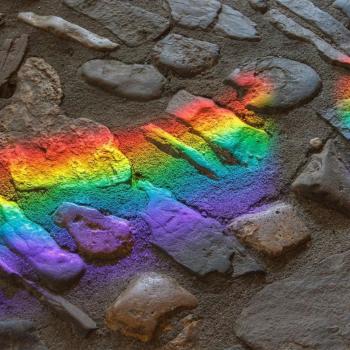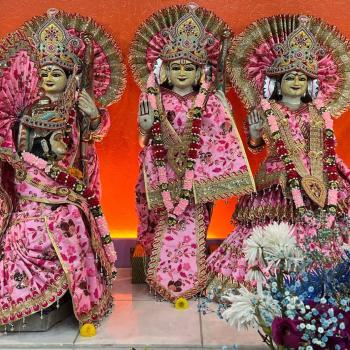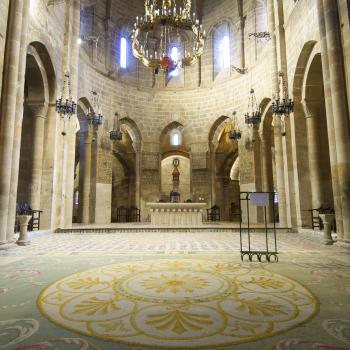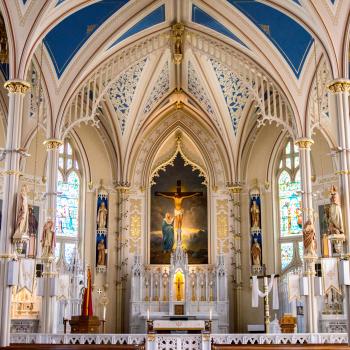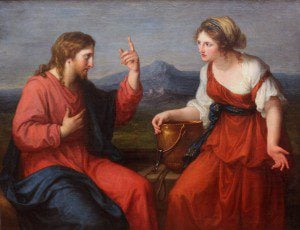
On the 3rd, 4th, and 5th Sundays of Lent, Catholic Churches with adults preparing to be baptized at the Easter Vigil will perform three successive rites called “the Scrutinies.” These rites, with roots dating back to the early Church, are part of a larger process called the Rite of Christian Initiation for Adults.
If you’re not familiar with these rites, they might feel like an unnecessary add-on to the Sunday Mass. But oneeds you understand the history and the theology behind the Scrutinies, you can see that they are not only ancient rites, but profoundly meaningful.
Each Scrutiny takes place during a Sunday Mass, and is thematically linked to the Gospel reading for that Mass (more on that later). The persons preparing for the sacraments (“the Elect”), along with their sponsors, bow or kneel before the celebrant and the assembly, who pray for them silently and with a series of intercessions. Culminating in a prayer of cleansing and protection with the laying-on-of-hands, each Scrutiny is a step in preparing the Elect for the celebration and initiation soon to come.
Understanding the Scrutinies
So what, exactly, are the Scrutinies? What is their spiritual meaning?
To answer this question, begin by considering the name of these rites. To put something under scrutiny means to examine it carefully. But what does this have to do with preparing for Christian initiation?
The etymology of the word is maybe partially helpful — it has a connotation of pawing through trash, looking for something valuable. We’ve all heard stories of someone throwing away a winning lottery ticket, only to spend hours or days at the landfill, trying to find that precious piece of paper.
Despite centuries of stern language in Christianity about the depravity of sinful humanity, I don’t believe God sees us as garbage! We are created in God’s image and likeness, after all. But I still think the etymology of scrutiny is partially helpful because of this notion of seeking out what is valuable.
A Catholic educator I know compares the Scrutinies to reading a contract or examining a house you are thinking of buying. Yes, it’s a close, critical look — but it’s looking for what is valuable.
When an editor offers me a publishing contract, I don’t read it with the idea of finding all the reasons I should turn it down. On the contrary, I’m looking primarily for what is valuable about the contract — and if there are any issues, I see those as matters for further negotiation, not deal-killers.
Same thing with having a house inspection before closing: as long as the house is basically sound, any problems discovered in the inspection are simply matters for insuring that the transaction is fair to all parties involved.
So the Scrutinies are God’s way of taking a close, loving look at the Elect. God does not scrutinize us (or baptismal candidates) in order to find everything that’s wrong with them, but to celebrate all that is beautiful and good and true in them.
And, as in the mundane examples given above — to identify those areas that stand in need of ongoing care and conversion (hardly a surprise, here, since the Catholic faith acknowledges that we are all “sinners” — broken and wounded — in some way).
Insight from the Gospel Readings
To take our understanding of the Scrutinies further, let’s look at the Gospel readings assigned for the Mass where a Scrutiny occurs. The three Scrutinies occur over a three week period (3rd, 4th, and 5th Sundays in Lent), so we have three Gospel readings to consider.
First Scrutiny: Jesus Encounters the Woman at the Well (John 4:5-42). Jesus breaks social convention to speak to a Samaritan woman he encounters at a well, in their conversation, he offers her living water. He says, “Whoever drinks the water I shall give will never thirst; the water I shall give will become a spring of water welling up to eternal life.”
Second Scrutiny: Jesus Heals a Man Born Blind (John 9:1-41). On a Sabbath day, Jesus heals a man blind since birth, so that God’s glory may be revealed in him. While this gets Jesus into trouble with the religious authorities, it’s a powerful story demonstrating Jesus’s words: “I am the light of the world” and as such, he calls this man form darkness to light.
Third Scrutiny: Jesus Raises Lazarus from the Dead (John 11:1-45). An emotional and moving story, Jesus comes to the home of his friends Mary and Martha, distraught over the recent passing of their brother. He calls the dead man to literally rise from the tomb — a call from death to new life. Jesus says, “Did I not tell you that if you believe you will see the glory of God?”
From sin to repentance, from thirst to satisfaction; from illness to health; from darkness to light; from death to new life. Jesus encounters three people in these Gospels, and they are changed forever.
He calls forth exactly what they need, whether it is forgiveness, or sight, or life. In so doing, he rocks their worlds. And the message for us: if we open our hearts to him, he’ll rock our worlds, too.
Encountering Christ Through the Scrutinies
So in the Scrutinies, Jesus encounters us. It’s not about us, it’s about him. He is the one doing the scrutinizing!
Jesus “scrutinizes” us, and finds all that is valuable within us. He also reveals to us the ways in which we are hurting, or sick, or sinful — but this is not to reject us, but to call us to new life and to healing.
I said up above that the Scrutinies culminate with a prayer of protection and cleansing. The traditional word for this prayer is exorcism. Talk about a big, scary word! We need to put all the horror movie clichés out of our mind when talking about the Scrutinies. These prayers are simply ways of calling on God — and trusting in God’s power — not only to affirm what is good within us, but to dispel whatever holds us back or causes us to resist grace and goodness in our lives.
Scrutinies are intended for those who are preparing for the Sacraments of Initiation: not only Baptism, but also Confirmation and Communion. But if you have already been baptized and are at a Mass with a Scrutiny, please join in praying for the Elect. And listen to the words of the intercessions and the prayers, and reflect on their meaning for your life, too. Just because you and I are already baptized does not mean we no longer need for Jesus to search us and behold us! Let the Scrutinies call you to the living waters, to the light, to new life. Let them call you to a closer walk with Christ.
Enjoy reading this blog?
Click here to become a patron.






